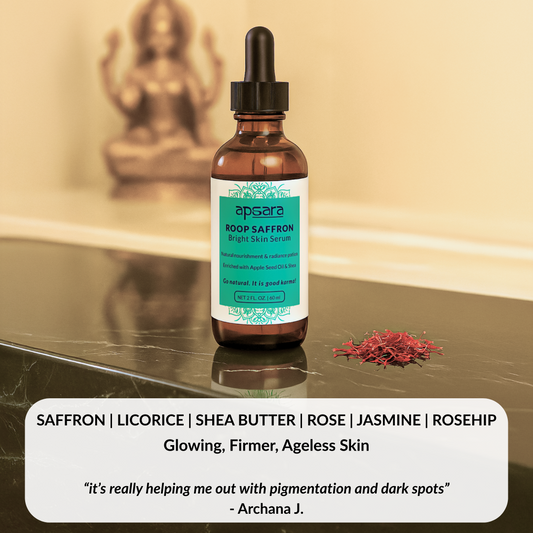Above: Sheetal Rawal, scientist (human genetics) & founder of Apsara Skin Care
By: Marty S.
If you have kept a running list of foods that people say you must eat to achieve a healthy diet, one food that likely comes up time and time again is probiotics. Probiotics are comprised of beneficial bacteria. These bacteria are meant to improve your digestion and encourage better gut health. As we’ve mentioned before, your gut health and your skin health are connected. Poor gut health (caused by a poor diet, lifestyle habits, et cetera) may reveal itself externally through inflammation, lackluster skin, and increased signs of premature aging.
However, when people tell you to include more probiotics in your diet, they’re not saying that there is a special bacteria you need to ingest to get these anti-aging benefits. You also don’t have to resort to a daily supplement either. Rather, probiotics are in a lot of natural foods that you will be able to easily find in your local supermarket or natural foods store. Today, we will share with you 3 of our favorites and tell you how you should take them. By eating more of these probiotics regularly, you may start to notice an uptick in your gut health as well as younger-looking skin, perhaps several years younger.
1. Vegan Yogurt
Of course, when we talk about probiotics, we have to mention yogurt! Yogurt is a probiotic because it undergoes the process of fermentation, which occurs when foods are exposed to yeast or bacteria in order to make something else. It sounds a little odd to eat foods that have been purposefully exposed to bacteria, but this bacteria is good for you. It is through the fermentation process that these bacteria can create probiotic foods. Yogurt, for example, is essentially fermented milk.
Apsara Skin Care is a vegan company so obviously, we cannot recommend eating any yogurt that is made with dairy. However, vegan yogurt is just as satisfying as dairy-based yogurt, and it still contains probiotics that your gut needs to be healthy and your skin needs to look flawless. Plus, vegan yogurts can contain nutrients like calcium and protein that are vital for a healthy body and skin. When looking for probiotic vegan yogurts, make sure that the label says “active cultures” or “live cultures”. Though all yogurts are fermented, some may undergo an additional process in which the probiotic bacteria are removed.
“But [my dry skin] did really clear up since I’ve been using it consistently so I don't see it anymore so that's great. Also, it smells really good so that's a plus. My skin also feels a lot more hydrated…”
2. Sauerkraut
Long before the invention of refrigerators, one of the main ways of preserving food was through fermentation. If there was a large harvest, for instance, food would have to be fermented to preserve as much of it as possible. Even though we don’t necessarily need to ferment our food nowadays to stop any of it from spoiling, fermented foods are still quite popular and a vital part of many cultures. Besides yogurt, sauerkraut has been prepared and consumed for a long time. Sauerkraut is a sour food made by fermenting (or pickling) cabbage. Because it is a probiotic, eating sauerkraut regularly can benefit your gut microbiome and encourage blemish-free, ageless skin.
Sauerkraut is an excellent anti-aging probiotic to try, but it is an acquired taste. If you don’t enjoy eating sour foods, it might be a hassle trying to add sauerkraut to your diet. However, at its core, sauerkraut is comprised of fermented vegetables, and another food that is made from fermented vegetables is kimchi. Kimchi is both spicy and sour, but more importantly, it too is a probiotic that can promote better gut health. So, whether you prefer sauerkraut or kimchi, getting more fermented vegetables in your diet is generally a good idea, especially if you care about the beauty and vitality of your skin.
3. Kombucha
Probiotics can also be drinks, too. If eating probiotic foods doesn’t satisfy you, you may want to try kombucha. To become a probiotic, kombucha undergoes a fermentation process involving a SCOBY (symbiotic culture of bacteria and yeast), after which the result is a slightly carbonated tea that can be either sweet or sour. What’s really fun about kombucha is that it is customizable, depending on how it is made. For example, if kombucha is brewed with green tea or black tea, it will have antioxidants that are necessary to stop free radical damage and fight premature signs of aging. You can also use your choice of fruits to create a kombucha drink that is a fruity, tasty, anti-aging sensation. If you want to drink some tea but you don’t want something hot, kombucha is a cool, refreshing alternative that can help you on your path to youthful skin.
With regards to all of the probiotics on this list, it is highly recommended to purchase kombucha from a source that you trust. It can be very easy to contaminate homemade kombucha (especially if you don’t know how to handle a SCOBY), and drinking kombucha with harmful bacteria will do far more harm than good. If you want to make your own kombucha at home, please be careful. Sanitize all of the containers and equipment you intend to use, and do some research on SCOBYs before purchasing one or making one from scratch.
You can even use probiotics on your skin to make it look more stunning. Listen to this episode of the Apsara Skin Care podcast to find out how to make this anti-aging probiotic DIY. Enjoy and please leave us a review on our iTunes podcast page!
For more anti-aging skin care advice and product recommendations, fill out this form to hear from us soon.
Go natural, It is good karma!




1 comment
Pls help me to suggest some antiageing facemask and creams